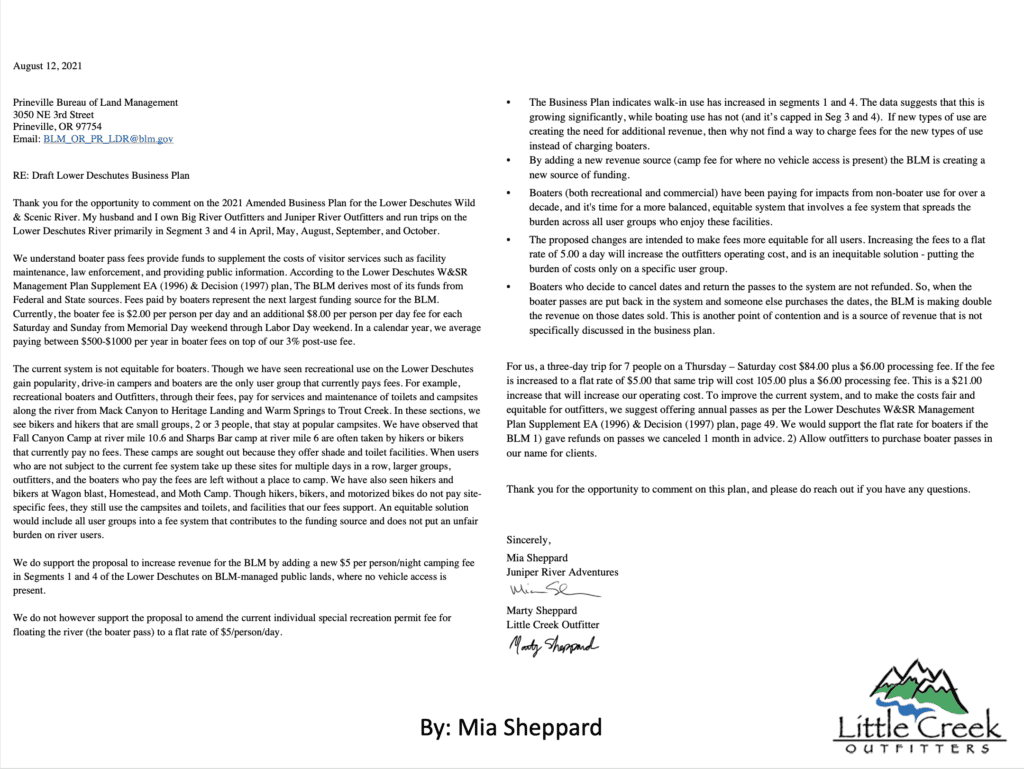Your individual voice is really powerful. You do not need to have an english or scientific background to write these letter. This is an opportunity to be involved in the decision making process.
Mia Sheppard, owner and guide of Little Creek Outfitters commissioner for Travel Oregon and a board member for the Oregon State Marine Board .
Mia shares tips for writing an effective comment letter. Mia lives in Maupin Oregon on the banks of the Deschutes River with her husband, Marty Sheppard and 13 year old daughter, 1 pointer, cat and 4 chickens. Together, Mia and Marty, have been guiding on the John Day, Deschutes, Grande Ronde and Sandy Rivers; teaching anglers the art of fishing and caring for the resources for close to 20 years.
Video Timeline –
- 0:00 – Intro
- 0:27 – Mia Sheppard “Your Voice is Powerful”
- 2:21 – Why are Comment Letters Important
- 2:31 – Agencies Going Through a Process
- 3:33 – NEPA (National Environmental Policy Act) Process
- 5:22 – Tips for Writing a Comment Letter
- 6:07 – You Do Not Need to Have a Scientific or English Degree to Write These Letters
- 7:37 – Example of Helpful and Unhelpful Comments
- 8:09 – Deschutes and John Day Management Plan
- 9:40 – Example of a Letter
- 9:55 – How to Find Information on Agencies Seeking Comments
- 10:26 – Terminology
- 11:03 – Powerful Way to Express Your Voice and Have a Stake in the Game
Terminology
- RMP – Resource Management Plan – is the guide to project management for the BLM (Bureau of Land Management).
- EIS – Environmental Impact Statement – statement outlining the impacts of the project.
- NEPA – National Environmental Policy Act – law requiring federal agencies to assess environmental impacts
Website Links
- Check your state’s wildlife page for new releases and commission meeting information – https://www.dfw.state.or.us/news/2021/index.asp
- District of Bureau of Land Management – https://www.blm.gov/press-release
- Department of Environmental Quality – https://www.oregon.gov/DEQ/Pages/index.aspx
- Oregon State Legislature – https://www.oregonlegislature.gov
Why are comment letters important
- Its an opportunity to be involved in the decision making process
- Gives a voice to the places, fish and people who don’t have a voice
- Opportunity to express your thoughts and ideas
- Opportunity to work with the agencies and locals – get to know the people responsible for the management of the places you visit and care about.
Tips for Writing Comment Letters
- Direct – State your subject clearly in the email subject line or first sentence of the letter. Stick to just one issue in the letter.
- Informative and be specific –Identify yourself as a constituent. State your views, support them with knowledge and, when appropriate, cite the bill number of relevant legislation (e.g., H.R. 1234 or S.3456).
- Substantive – Question the accuracy of the information, provide new information, present a reasonable alternative
- Facts and Courteous – Rely on the facts, personalize the issue. Explain how the issue affects your life. Avoid personal attacks, threats of political influence.
- Keep it local – Always explain the hometown relevance of the issue. Use “I” statements and cite specific times and examples.
- Constructive – Be positive about the issue and offer recommendations or solutions
- Be Helpful – Offer to provide additional information if needed, and provide your contact information.
- Appreciative – thank members or agencies for their attention. Follow the issue and thank decision makers later if they vote your way.
Examples of helpful and unhelpful comments
- Good comment – High water temperatures in the Lower Deschutes is harmful for steelhead. Studies show…. Releasing cold water will help fish.
- Bad comment – Stop killing our fish!
- Good Comment – I do not support a fee increase for boaters but support a fee for walk in hikers. A fee increase is not fair for users that have been paying for decades. A fee increase will increase our overhead 5%.
- Bad Comment – I do no support a fee increase.
Example of a Comment letter






